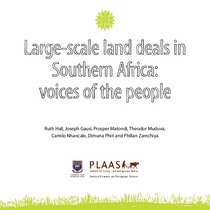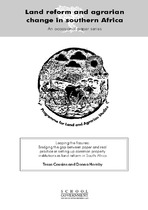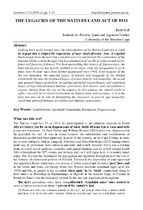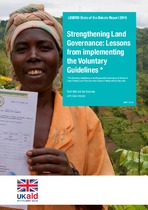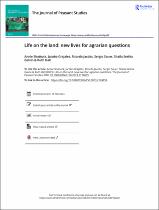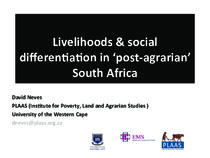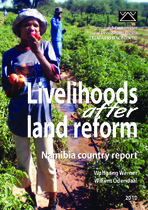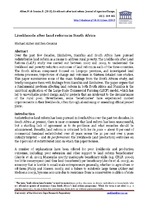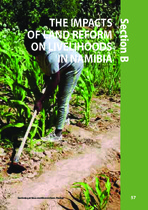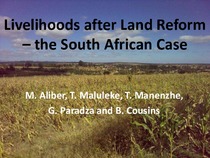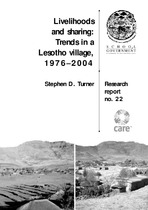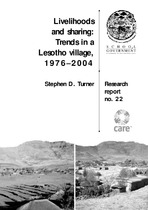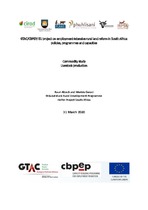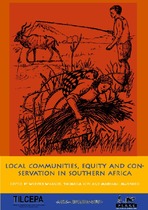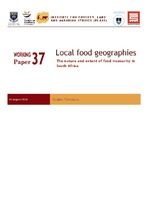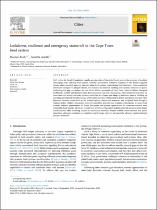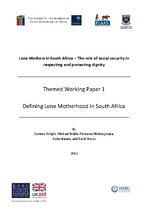Browsing Institute for Poverty, Land and Agrarian Studies (PLAAS) by Title
Now showing items 309-328 of 608
-
Large-scale land deals in Southern Africa: voices of the people
(Institute for Poverty, Land and Agrarian Studies, University of the Western Cape, 2015)This book presents case studies of large-scale land deals in Southern Africa. It aims to provide an accessible and vivid window into the lived realities and responses of rural people who are affected by such deals. For ... -
Leaping the fissures: Bridging the gap between paper and real practice in setting up common property institutions in land reform in South Africa
(Institute for Poverty Land and Agrarian Studies (PLAAS), 2002)New common property institutions (CPIs) were created in South Africa soon after 1994 to enable self-constituted groups of people a choice about how they wished to acquire, hold and manage land. They were to provide rural ... -
The legacies of the Natives Land Act of 1913
(Stellenbosch University, 2014)Looking back at the century since the promulgation of the Natives Land Act, it can be argued that it shaped the trajectories of most South Africans’ lives. It expelled black people from the land into crowded reserves and ... -
LEGEND state of the debate report 2016 - Strengthening land governance: Lessons from implementing the Voluntary Guidelines
(Legend, 2017)The Voluntary Guidelines on the Responsible Governance of Tenure of Land, Fisheries and Forests in the Context of National Food Security (VGGT) are a globally agreed standard. Achieving this normative consensus in ... -
Life on the land: New lives for agrarian questions
(Taylor and Francis Group, 2023)The politics of food, climate, energy, and the yet unfinished work ofending colonialism run square through questions of land. Theclassical agrarian question has taken on new forms, and a newintensity. We look at four ... -
Livelihoods & social differentiation in ‘post-agrarian’ South Africa
(2017)• Legacy: Settler colonialism & migrant labour • Industrialization & proletarianisation • Dichotomous agrarian landscape • Rural poverty, esp. former homelands • Longstanding deagrarianisation -
Livelihoods after land reform
(Institute for Poverty, Land and Agrarian Studies, University of the Western Cape, 2010)In 1990, Namibia emerged from colonial rule with a skewed distribution of agricultural land and high levels of poverty. The new government led by SWAPO Party initiated a process to address the land question within the ... -
Livelihoods after land reform in South Africa
(Wiley, 2013)Over the past few decades, Zimbabwe, Namibia and South Africa have pursued redistributive land reform as a means to address rural poverty. The Livelihoods after Land Reform (LaLR) study was carried out between 2007 and ... -
Livelihoods after land reform: Namibia country report (2010)
(Land, Environment and Development Project, Legal Assistance Centre, 2010) -
Livelihoods after land reform: Namibia country report (2010) Section B
(Land, Environment and Development Project, Legal Assistance Centre, 2010)The first AALS farmers in Hardap obtained their land in 1992, and the most recent in 2003. In Omaheke, the first AALS farmer obtained his farm in 1992 and the most recent, a woman, in 2000. Thus in both regions the oldest ... -
Livelihoods after land reform: The impacts of land reform on livelihoods in Namibia: Section B
(Institute for Poverty, Land and Agrarian Studies, University of the Western Cape, 2010)The first AALS farmers in Hardap obtained their land in 1992, and the most recent in 2003. In Omaheke, the first AALS farmer obtained his farm in 1992 and the most recent, a woman, in 2000. Thus in both regions the oldest ... -
Livelihoods after land reform: The South African case
(Institute for Poverty Land and Agrarian Studies (PLAAS), 2012)SA’s land reform regarded as a failure – economic objectives – the spectre of ‘failed projects’ – changing the racial pattern of land ownership – too slow • No consensus as to why, or what to do • Even so, ambitious ... -
Livelihoods and sharing: Trends in a Lesotho village, 1976–2004
(Institute for Poverty, Land and Agrarian Studies, University of the Western Cape, 2005)In 2004 I was fortunate enough to be able to return to Ha Tumahole, the village in Lesotho where I undertook research on farming and livelihoods in 1976–77, and spend four weeks learning about what had changed in ... -
Livelihoods and sharing: Trends in a Lesotho village, 1976–2004
(PLAAS, University of the Western Cape & Cooperative for Assistance and Relief Everywhere Inc. (CARE), 2005-10)The study compares the livelihoods and inter-household sharing mechanisms in a Lesotho village across a 28 year period. The report examines the complex socio-economic structures and systems that are in place in the rural ... -
Livestock and the rangeland commons in South Africa’s land and agrarian reform
(NISC (Pty) Ltd and Taylor & Francis, 2013)Land and agrarian reform has the potential to expand South Africa’s rangeland commons and enhance their contribution to the livelihoods of the rural poor, yet to a large extent this has been an opportunity missed. ... -
Livestock production
(GTAC, 2020-03-31)This paper is a thematic study for livestock production by smallholders and small-scale black commercial farmers in South Africa. Its aim is to identify the potential for successful expansion of the number of such farmers ... -
Local communities, equity and conservation in southern Africa: A synthesis of lessons learnt and recommendations from a southern African technical workshop
(Institute for Poverty Land and Agrarian Studies (PLAAS), 2003)This publication reports on a technical workshop entitled ëCommunities and Conservation in Southern Africa: Key Issues and Challenges towards a more Equitable and Sustainable Futureí, which was held on 26ñ28 February 2003 ... -
Local food geographies: The nature and extent of food insecurity in South Africa
(Institute for Poverty, Land and Agrarian Studies, University of the Western Cape, 2016-08)Food insecurity is a challenge for most countries in the Global South. South Africa is no exception - a significant proportion of its population still remains in poverty and is therefore vulnerable to food insecurity. ... -
Lockdown, resilience and emergency statecraft in the Cape Town food system
(Cities, 2022)Well before the Covid-19 pandemic, rapidly growing cities of the global South were at the epicenter of multiple converging crises affecting food systems. Globally, government lockdown responses to the disease triggered ... -
Lone Mothers in South Africa - The role of social security in respecting and protecting dignity.
(Institute for Poverty, Land and Agrarian Studies, University of the Western Cape, 2013)The purpose of this document is to define the group of people whom we are considering as part of the project ‘Lone Mothers in South Africa: The role of social security in respecting and protecting dignity’. Setting to ...

